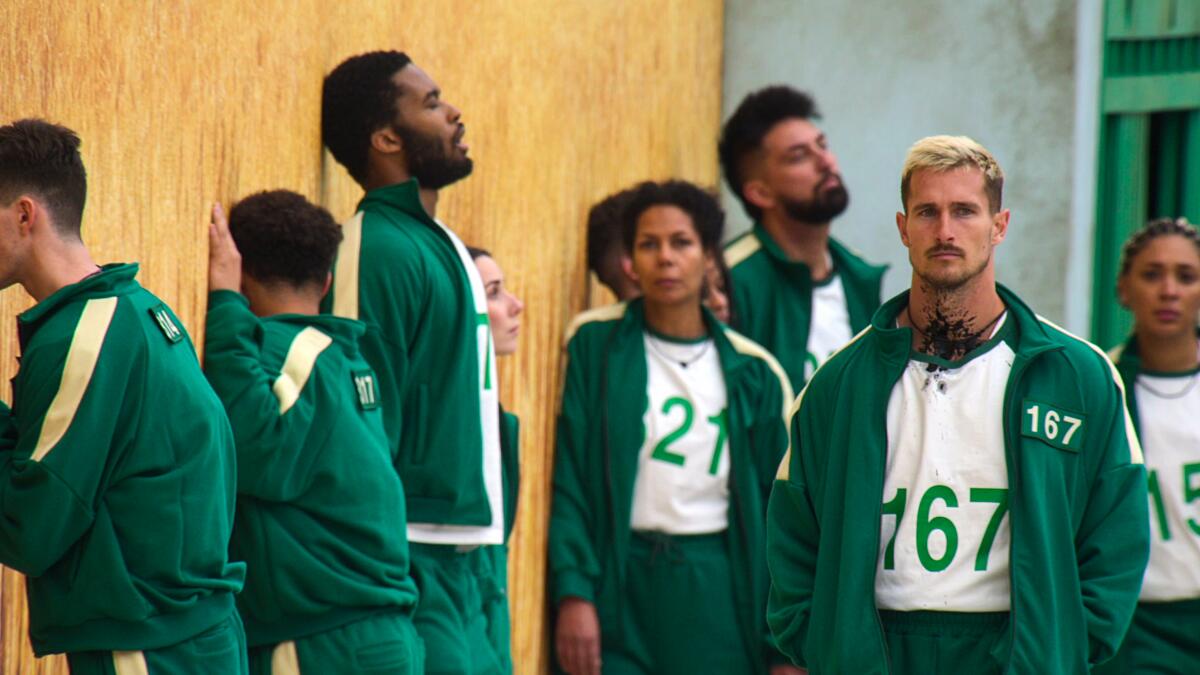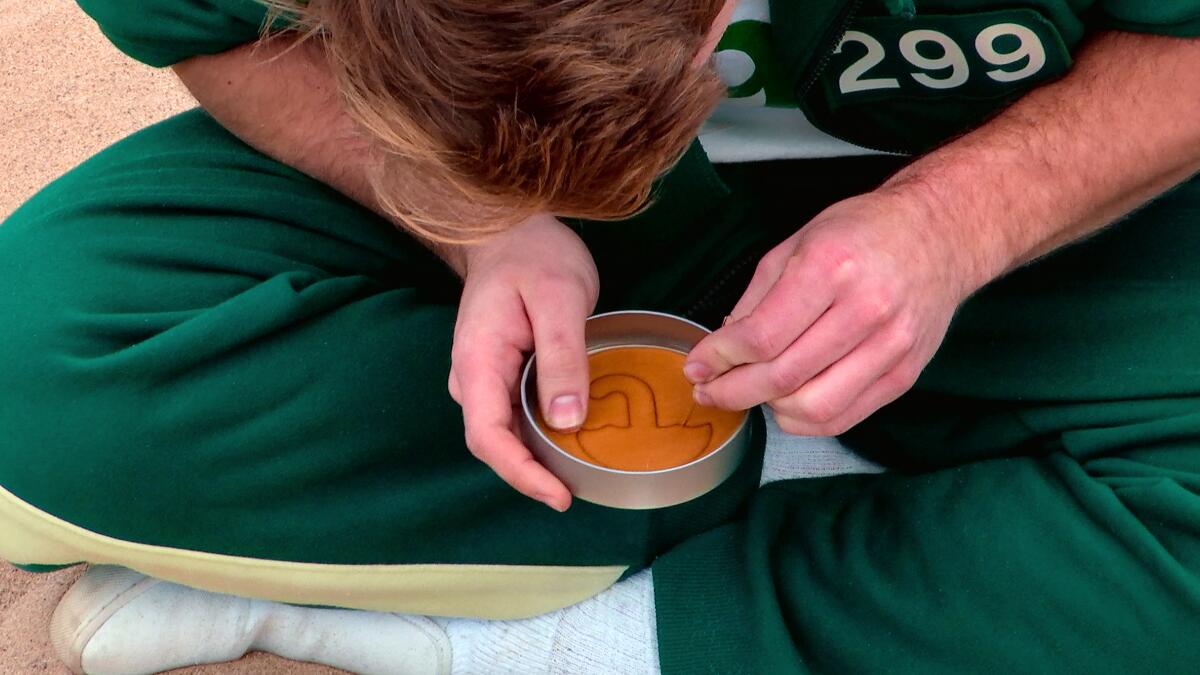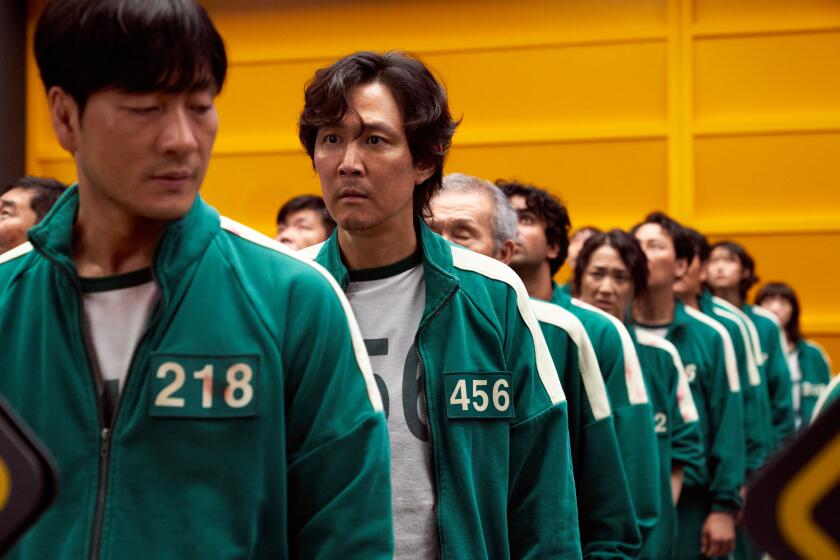Review: ‘Squid Game: The Challenge’ brings the tension of Red Light, Green Light to life

I am not a competitive person by nature — or perhaps I just prefer to suppress whatever is competitive in me. You may say that I simply don’t like losing, but I don’t like winning either, as this requires someone else to lose. It makes me tense.
I’m enchanted as much as anyone by excellence of any sort, but don’t need it to be arranged into contests; I’ve no use for the Emmys, the Oscars, the Grammys, the Tonys, the Nobel or Pulitzer Prizes, or who wins the World Series or the World Cup. This obviously is not a view shared by the many millions, possibly billions, who feast or snack on such things the world over.
Television, of course, has a long history with contests and games, but as they tend to be low-strategy, with no real opportunities for backstabbing or under-bus-throwing, or contestants who declare, “I’m sorry, but this is a contest, and I’m here to win,” to excuse some unpalatable behavior, I find them tolerable, and sometimes fun. (I am, I suppose, happy enough to see a devious person voted off the island or thrown out of the house, if only because this does not happen enough in real life.) “Charley Weaver to block” is about as strategic as classic game shows ever got. I love the “The Great British Baking Show” because everyone is mutually supportive, and even helpful against their own best interests; but even my adored “MasterChef Junior” gives its young cooks opportunities to undermine an opponent. And, frankly, I would be happy enough if no one were ever eliminated. Just let me watch them work and improve!
This is why I am not a TV executive.

The 2021 Korean series “Squid Game” was a global phenomenon, a suspenseful satire on late-stage capitalism strung on the framework of an elimination — literally elimination — competition show, in which characters in financial distress were gulled into participating into murderous versions of children’s games for a giant cash prize. It’s a horror movie premise, dignified by thoughtful writing and performances. (Not that it matters, but I suppose I should mention that it won six Emmys, including ones for director Hwang Dong-hyuk, who also wrote the series, and actors Lee Jung-jae and Lee You-mi.)
‘Squid Game’ has conquered the world, according to the streamer. Our TV critic explains what it is — and why you might like to catch up.
While the world waits for a second season — one is reportedly coming — Netflix, which streamed the original here, is filling the gap with “Squid Game: The Challenge,” transmuting Hwang’s fictional game into a real one, minus the executions. My nearly simultaneous thoughts on hearing this were, “Why would anyone make an actual show out of this cruel and unusual concept” and “Why wouldn’t they?” It’s just the logical extension of the series the takeoff took off on.
Premiering Wednesday, “The Challenge” replicates “Squid Game’s” sets and costumes and borrows some games from the series, but invents some of its own. The first episode offers, as it must, the original series’ signature game, “Red Light, Green Light,” in which 456 starting players advance across a killing field; if they fail to freeze when a big doll stops singing, they are shot. (Explosive squibs identify the losers, who fall down “dead.”) Obviously the game is arranged to get to a single winner within a set number of episodes, so there will be a whole lot of winnowing going on.
As in the series, contestants are housed in a giant dormitory, over which hangs a big translucent sphere filled with money (and more money as contestants go home). They are fed food none of them like, which makes better food a reward. Alliances form, are undone by events, or the crafty maneuvering of crafty maneuverers. As the show goes on, the game takes on its own, increasingly less fun reality; going home is a kind of death, after all — of hope, anyway, to come away with life-changing gobs of money.

Even its fans know that reality television is, like, 80% fiction, wrangling a range of more or less predictable possibilities within parameters set by the producers, while their true-life subjects supply the details and the dialogue that will be massaged into something like a story. Out of a largely anonymous crowd, “The Challenge” focuses on a handful of players who emerge as characters — or the semblance of characters, being quickly sketched. We watch them from afar, security camera style, or close-up in conversations that are obviously staged for the camera. If nothing else, the show demonstrates that the world is full of people who are not you, but have their own ways of seeing and doing things, their own histories to overcome and fates to work out, and that’s always a lesson worth relearning.
‘Squid Game’ creator Hwang Dong-hyuk and his collaborators put together the subliminal pieces of the hit show’s puzzle.
Notwithstanding my declared non-competitiveness, I have not come to bury the great mass of game shows, which by and large offer benign fun and often a chance to play along at home, secure in the knowledge that you can neither lose nor win. In “Squid Game,” the cruelty — as they say of certain modern politicians and parties — was the point, and a degree of that has been imported into the “The Challenge.” Along with the usual tension of the ticking clock, the tough task, the difficult decision — all very effective — participants are made uncomfortable on a moral level; one might be called upon to choose between acting nobly and metaphorically assassinating a competitor, in front of the crowd. They may be forced to face themselves. It’s clever that way.
The not-so-shocking revelation of the original “Squid Game” was that these poor schmoes were being toyed and done away with for the entertainment of the jaded rich. (It’s not an entirely novel concept — or an arbitrary one, given how the real world works.) It was a series about an audience, with an audience, which gave a viewer some cover, some distance, even as he might be enjoying the awfulness. But in “Squid Game: The Challenge,” the only audience is, you know, the audience, make of us what you will.
More to Read
The complete guide to home viewing
Get Screen Gab for everything about the TV shows and streaming movies everyone’s talking about.
You may occasionally receive promotional content from the Los Angeles Times.









